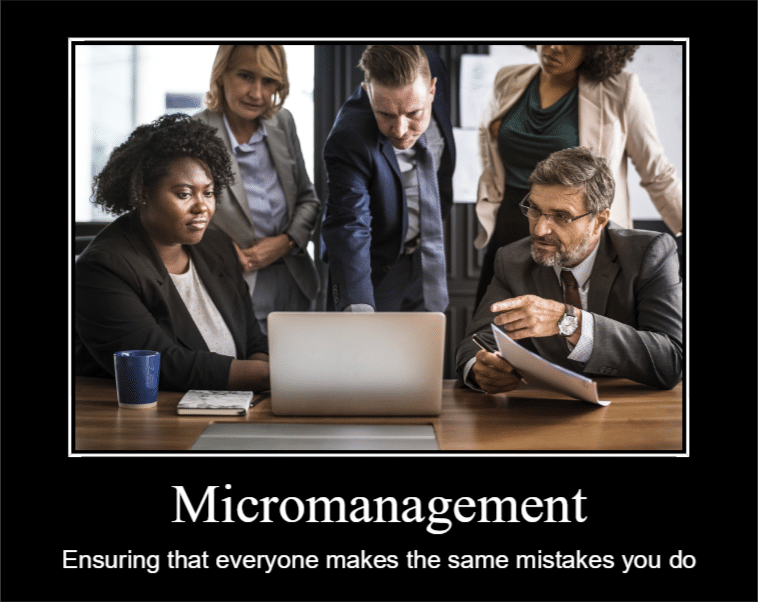What is Micromanagement?
You know that feeling when someone is constantly breathing down your neck? Watching your every move, questioning your every step, asking for updates five minutes after you just sent one? Yeah, that’s micromanagement in action, and if you’ve ever been on the receiving end of it, you know how draining, frustrating, and downright insulting it feels.
The truth a lot of people don’t want to admit is, micromanagement is rarely about maintaining high standards or ensuring quality. Most of the time, it’s about fear. Fear of failure. Fear of losing control. Fear of being blamed if things go wrong. It’s a fear that gets projected onto the people doing the actual work. Instead of empowering them to deliver, it ends up suffocating their creativity, destroying morale, and quietly killing the very excellence it claims to protect.
Before we sound the alarm, it’s important to say: a lot of micromanagers are not villains. Many are actually good people who care deeply about their work, too deeply sometimes.
Maybe they got burnt in the past by mistakes they didn’t catch. Maybe they have perfectionist tendencies. Maybe their own bosses are breathing down their necks. Maybe they don’t even realise they’re doing it.
But here’s the tough love: Good intentions don’t erase bad impact. At the end of the day, no matter how pure the motive, micromanagement still creates toxic environments. Period.
No matter how nicely it’s wrapped up, micromanagement screams one very loud message: “I DO NOT TRUST YOU!” And trust me, people hear it, loud and clear.
Even when a manager or team lead has the best of intentions (“I just want to make sure everything goes smoothly”), constant hovering feels like a slap in the face. It reduces people to task-doers rather than thinkers. It tells them, “You’re only valuable if you do things exactly how I would do them,” which, frankly, is a one-way ticket to disengagement. If you can’t trust your team to use their judgement, why hire them in the first place?
Costs of Micromanagement
Crushed Innovation
Micromanaged teams don’t take risks. They don’t volunteer new ideas. They don’t experiment or think outside the box, because why would they? Whenever a deviation from “the way it’s always been done” is scrutinised or shut down, you quickly learn that creativity isn’t just unwelcome; it’s dangerous. It feels safer to stick to the script, do exactly what’s asked, nothing more, nothing less, and avoid anything that could invite extra attention or correction.
Over time, something subtle but damaging starts to happen: people stop thinking for themselves. The spark that drives innovation – curiosity, imagination, and boldness – slowly fades out. Team members who once had fresh perspectives and energy become passive, waiting for instructions instead of taking initiative. Ownership becomes a foreign concept because how can you own anything you’re not trusted to build or improve?
This is not just employees’ problem; it’s a business problem. Organisations that kill innovation by micromanaging don’t just lose good ideas; they lose their edge. They become stale, robotic, and painfully uninspired. Eventually, they get left behind by more adaptive, dynamic teams who know how to trust their people to think, to create, and to take smart risks.
Micromanagement might feel like control in the short term, but in the long run, it’s the fastest way to grind both performance and potential into dust.
Delayed Growth
When people are not trusted to make decisions, they don’t grow. They don’t learn. They don’t sharpen their skills. Guess what? Neither does the organisation. Over time, the team becomes passive, hesitant, and overly dependent, not because they’re incapable, but because they’ve been conditioned to always ask for permission first. Companies plateau because no one is encouraged to think bigger or step into leadership roles at their level. Everyone just… waits.
Wasted Time
Micromanagers spend a ridiculous amount of time checking, double-checking, redoing, and hovering. It’s almost like a full-time job in itself, one that doesn’t actually move the team forward. Every minute spent obsessing over tiny details or reworking what someone else has already done is time stolen from what leaders should be doing: setting the bigger vision, clearing obstacles out of the way, and empowering their team to shine.
Meanwhile, the real responsibilities of leadership, like thinking strategically, building a strong culture, and inspiring growth, get shoved aside. The team ends up frustrated and demotivated. The manager ends up exhausted and overwhelmed. And ironically, the very “perfection” they were chasing slips even further out of reach. Micromanagement isn’t just inefficient; it’s a huge drain on everyone’s time, talent, and trust.
Burnout and Resentment
Nobody wants to come to work every day feeling like they’re walking on eggshells. It wears people down emotionally. It turns once-passionate employees into checked-out shells who are counting down the hours/days until they can leave, and funny enough, micromanagement often becomes a self-fulfilling prophecy: you don’t trust people, so they stop showing initiative, which you then point to as “proof” that you need to micromanage them. A vicious, soul-sucking cycle.

How to Deal with Micromanagers
Let’s face it, you can’t always change your boss overnight, but you can take some steps to protect your sanity and navigate the situation better:
1. Over-Communicate Proactively
If you know your manager likes constant updates, beat them to it. Set the tone early by sending regular progress reports before they even ask. It gives them a sense of control while giving you breathing room. Plus, it subtly builds trust over time because you’re showing them you’re responsible and in control which might just help loosen their grip eventually. Think of it as steering the narrative instead of reacting to it.
2. Clarify Expectations
Sometimes micromanagement happens because of fear of the unknown. Ask very clear questions.
“What does success look like for this task?”
“Are there any specific steps you want followed, or can I work independently toward the end goal?”
Nailing down expectations gives you a clearer runway, and sometimes, it reassures the micromanager enough to back off a little.
3. Build Trust in Small Wins
Trust isn’t given freely; it’s earned. Find small, low-risk tasks where you can show you can be trusted to deliver high-quality work without constant supervision. Over time, consistent results can sometimes help loosen the grip. Of course, it’s not a guaranteed fix because the truth is, some micromanagers will micromanage no matter how competent you are. But building a strong track record gives you the best possible shot at creating a little more breathing room.
4. Know When to Have the Hard Conversation
If micromanagement is getting unbearable, it may be time to have an honest (but respectful) conversation. Express how much you care about delivering excellent work, but gently highlight that constant checking actually slows you down.
Be solution-oriented, not confrontational. Offer ideas for how you could work more independently while still keeping them in the loop.
5. Protect Your Mental Health
Ultimately, you have to know what you can and can’t control. If you’ve tried everything and nothing changes, it’s not a reflection of your worth or your skills. Sometimes, the bravest and healthiest thing you can do is to start quietly planning your next move. Look for environments that encourage autonomy, that empower people to grow, and that value trust as much as talent. It’s not quitting; it’s choosing yourself. It’s preserving your creativity, your energy, and your confidence for a place that deserves it.
Micromanagement can chip away at your self-belief if you let it. Don’t.
Your ability to lead yourself, think independently, and take initiative is your superpower. Protect it fiercely. Nurture it in places and with people who allow it to shine.
Finally, trust is a two-way street:
Work isn’t supposed to feel like a surveillance camp. It’s supposed to be a place where your talents are trusted, your ideas are valued, and your growth is encouraged. Micromanagement kills all of that. Slowly but surely.
So whether you’re a manager reading this or someone navigating a micromanaged workplace, remember: trust is the lifeline of every thriving team. Without it, everything else is just survival.
To anyone who feels constantly second-guessed, doubted, or micromanaged: it’s not because you’re not good enough. It’s often because someone else is afraid. Don’t internalise their fear. Keep showing up. Keep doing excellent work, and when the time comes, know when to take your talents somewhere they’re trusted and celebrated. You deserve that.
Ever worked for/with a micromanager? How did you cope? Share in the comments.
Stay frosty!




